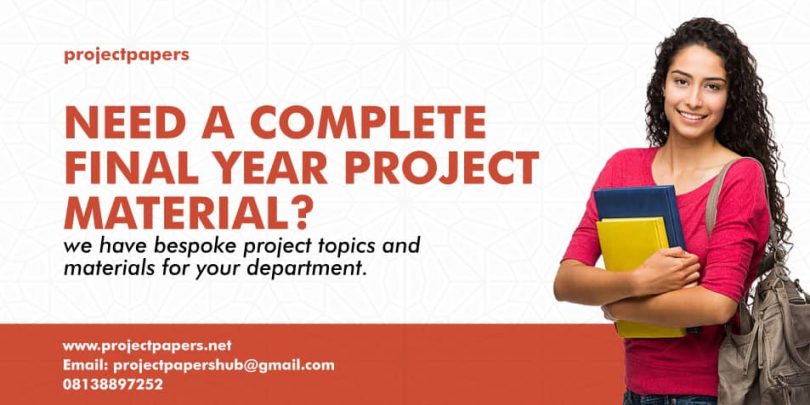Advertisements
Source and Structure of Knowledge Factors Influencing Students Achievement in Accounting Concepts in Ondo State, Nigeria
Content Structure of Source and Structure of Knowledge Factors Influencing Students Achievement in Accounting Concepts in Ondo State, Nigeria
- The abstract contains the research problem, the objectives, methodology, results, and recommendations
- Chapter one of this thesis or project materials contains the background to the study, the research problem, the research questions, research objectives, research hypotheses, significance of the study, the scope of the study, organization of the study, and the operational definition of terms.
- Chapter two contains relevant literature on the issue under investigation. The chapter is divided into five parts which are the conceptual review, theoretical review, empirical review, conceptual framework, and gaps in research
- Chapter three contains the research design, study area, population, sample size and sampling technique, validity, reliability, source of data, operationalization of variables, research models, and data analysis method
- Chapter four contains the data analysis and the discussion of the findings
- Chapter five contains the summary of findings, conclusions, recommendations, contributions to knowledge, and recommendations for further studies.
- References: The references are in APA
- Questionnaire.
Abstract of Source and Structure of Knowledge Factors Influencing Students Achievement in Accounting Concepts in Ondo State, Nigeria
This study examined the source and structure of knowledge factors influencing students’ achievement in selected Accounting concepts in Ondo State, Nigeria. This has become necessary because of the poor performance of students in the subject. This research aimed to know the influence of the source and structure of knowledge factors on students achievement in Accounting because poor performance in the subject limits their potential for advancement to tertiary institutions and their career. The study adopted descriptive survey design. The sample consists of 201 students selected by simple random sampling in four secondary schools in Akoko North East Local Government, Ondo State. The data was subjected to multiple regression analysis and the results showed that there is no significant relationship between source and structure of knowledge and students’ achievement in Accounting concepts (r=0.13; p>0.05). The findings also showed that the source of knowledge (β= -0.06; t=-0.068; p>0.05) and the structure of knowledge (β=-0.05; t=-0.055; p>0.05) have no significant relative influence on students’ academic achievement in Accounting concepts.
Based on the findings of the study, it was recommended that other factors that can possibly affect students’ performance in Accounting concepts such as parents’ factors, peer influence, students interest in the subject and the socio economic status or family background should be considered.
KEYWORDS: Source of Knowledge, Structure of Knowledge, Academic Achievement.
Advertisements
TABLE OF CONTENT
Title Page
Title Page i
Certification ii
Dedication iii
Acknowledgement iv
Abstract v
Table of Content vi
CHAPTER ONE: INTRODUCTION
Background to the Study 1
Statement of the Problem 4
Purpose of the Study 5
Research Questions 5
Significance of the Study 6
Scope of the Study 6
Definition of Terms 6
CHAPTER TWO: REVIEW OF RELATED LITERATURES
Introduction 8
Theoretical Framework 8
Source of Knowledge 10
Structure of Knowledge 11
Teachers’ Effectiveness and Academic Achievement 12
Instructional Material Use and Academic Achievement 14
Internet Usage and Academic Achievement 15
Curriculum and Academic Achievement 17
Method of Teaching and Academic Achievement 19
Summary 21
CHAPTER THREE: RESEARCH METHODS
Introduction 23
Research Design 23
Population of the Study 23
Sample and Sampling Technique 24
Research Instruments 24
Validity of the Instrument 25
Reliability of the Instrument 25
Administration of the Instrument 25
Data Analysis 26
CHAPTER FOUR: RESULTS AND DISCUSSION
Demographic Data Presentation 27
CHAPTER FIVE: SUMMARY, CONCLUSION AND RECOMMENDATION
Discussion of Findings 30
Summary 31
Conclusion 31
Recommendations 32
Limitations to the Study 32
Suggestions for Further Studies 33
REFERENCES 34
APPENDIX 41
Advertisements


